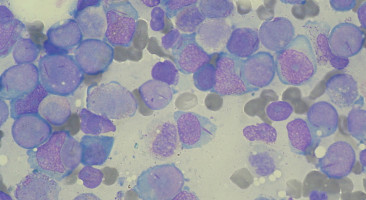
A combination of the standard-of-care chemotherapy drug known as azacitidine, with nivolumab, an immune checkpoint inhibitor, demonstrated an encouraging response rate and overall survival in patients with relapsed or refractory acute myeloid leukaemia (AML) according to findings from a Phase II study at The University of Texas MD Anderson Cancer Center.
Results from the trial, led by Naval Daver, M.D., associate professor of leukaemia, were published in the Nov. 8 online issue of Cancer Discovery.
The study followed 70 patients with an average of two prior treatments for relapsed AML, and reported a 33 percent overall response with 22 percent of patients in complete remission.
The drug combination was particularly effective in patients who had not previously received hypomethylating agents (HMAs) such as azacitidine or decitabine, with an overall response rate of 52 percent in these patients.
"In addition, bone marrow samples taken prior to treatment indicated a higher frequency of pre-therapy bone marrow CD3 and CD8 cells predicted for response to therapy," said Daver. "In particular, CD3 appeared to have a high sensitivity and specificity rate for predicting response, indicating it might serve as a reliable biomarker for selecting patients for this combination therapy."
Azacitidine is approved in the U.S. and Europe for patients with myelodysplastic syndrome (MDS), and is approved in Europe and commonly used in treating older patients with newly diagnosed AML.
HHMAs such as azacitidine, promote anti-tumour signalling, and dampen anti-tumour immunity by increasing expression of immune checkpoint antibodies PD-1 and PD-L1 in AML and other cancers.
"Over the last decade, six PD-1, PD-L2 and CTLA-4 antibodies have been approved for over 25 indications in 10 tumour types in the U.S. and Europe," said Daver.
"However, single agent PD-1 antibodies have shown little effect in patients with relapsed AML or high-risk MDS. This study was designed to assess whether the addition of nivolumab to azacitidine was safe and effective."
Treatment consisted of intravenously or subcutaneously administered azacytadine, and nivolumab given as an infusion.
Eleven percent of patients experienced severe or potentially life threatening side effects, although the majority were successfully treated.
Overall survival in all patients was 6.3 months.
Survival in first relapsed patients was most encouraging at 10.6 months, which is double that of observed survival with azacitidine alone in similar patients at MD Anderson.
A randomised Phase III study with this combination in the frontline setting has been initiated.
Other ongoing studies using this approach include a randomised Phase II study of azacytadine with or without PD-L1 inhibitor in frontline elderly AML patients, and a randomised trial of PD-1 inhibitors for eradication of minimal residual disease in high-risk AML patients in remission.
"We believe that implementation of clinical and immune biomarkers to select patients are likely to yield further improved outcomes with these types of therapies in AML," said Daver.